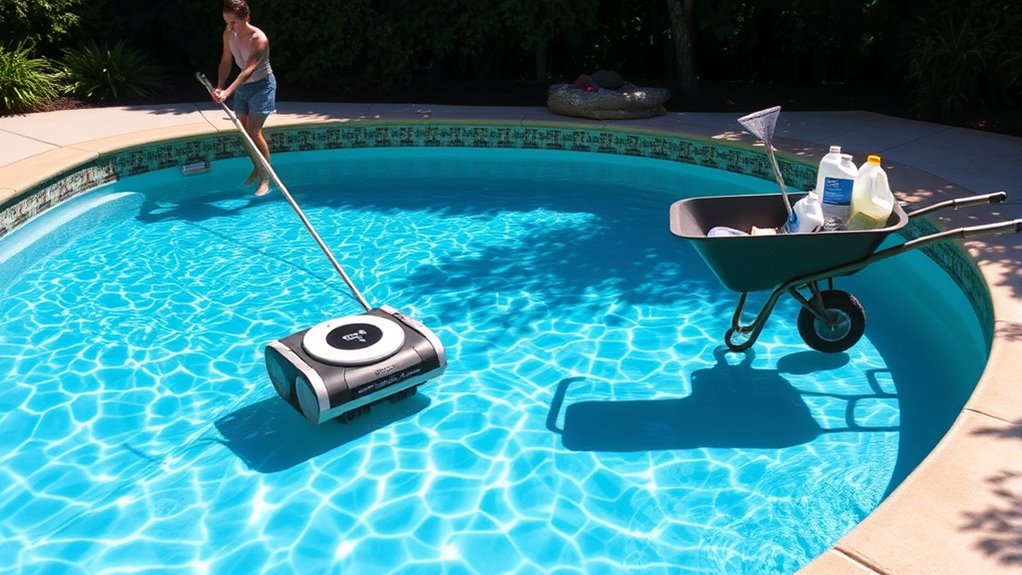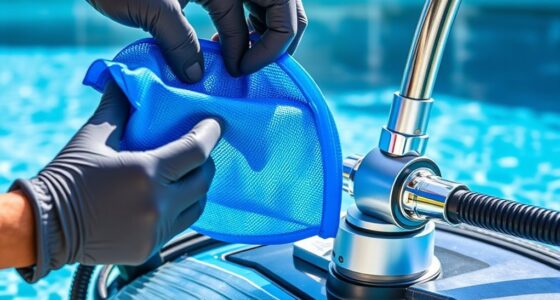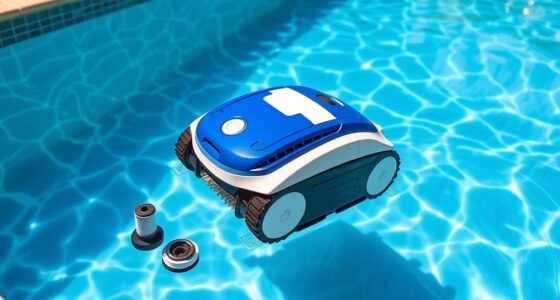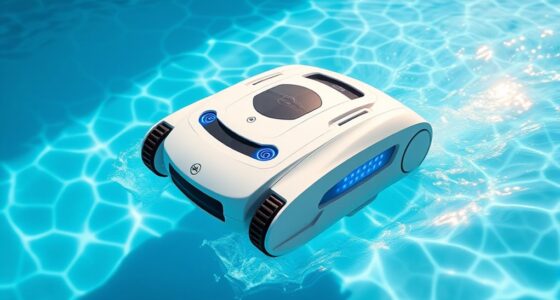Even with automatic cleaners, you still need to manually check your water chemistry regularly, balancing chemicals like chlorine and pH to keep water safe and clear. You must inspect and maintain your pool equipment, ensuring filters and pumps work properly. Don’t forget to skim debris off the surface and look for cracks or damage in the pool’s surface. Staying on top of these tasks helps your pool stay in great shape—more tips await if you look further.
Key Takeaways
- Regularly test and adjust water chemistry to prevent algae and maintain optimal sanitizer effectiveness.
- Manually skim surface debris and inspect for algae or surface damage to ensure water clarity.
- Check and clean pool filters and equipment to support automatic cleaner performance and prolong lifespan.
- Inspect pool structure for cracks, chips, or discoloration that automatic cleaners might miss.
- Monitor safety features and equipment function to prevent issues that automatic cleaners cannot address.
Monitoring and Adjusting Water Chemistry
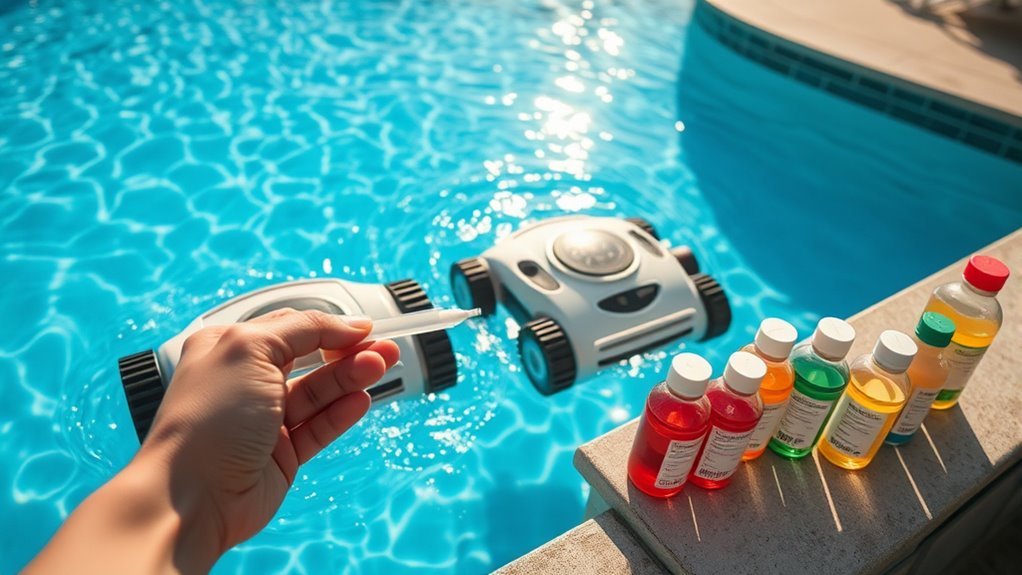
Monitoring and adjusting your pool’s water chemistry is essential to keep the water safe, clear, and balanced. Regularly check your chemical levels to ensure proper chemical balancing, which prevents issues like cloudy water or irritating skin. Test chlorine levels, pH, alkalinity, and calcium hardness using a reliable test kit. If chlorine is low, add sanitizer to kill bacteria and prevent algae growth. Keep pH in the ideal range (7.2–7.6) to optimize sanitizer effectiveness and reduce scaling or corrosion. Proper chemical balancing also plays a key role in algae prevention, as imbalanced water creates conditions conducive to algae blooms. Consistent monitoring and adjustments help maintain a healthy, inviting pool while reducing the need for more intensive treatments later on. Additionally, understanding the importance of indoor air quality can help you create a healthier environment around your pool area. Maintaining proper water chemistry not only ensures safety but also extends the lifespan of your pool equipment and surfaces. Regular testing also supports preventing corrosion, which can damage pool components if left unchecked. Being aware of chemical levels helps you respond quickly to any imbalances before they cause more serious problems.
Inspecting and Maintaining Pool Equipment
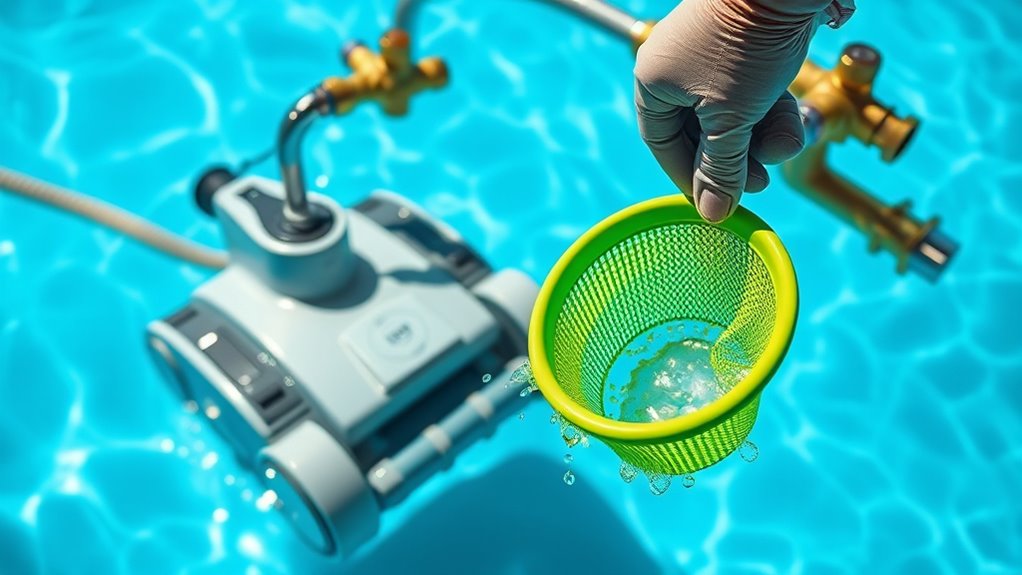
Regularly inspecting your pool equipment helps prevent breakdowns and keeps everything running smoothly. You should check the pump and filter for leaks, unusual noises, or clogs, and guarantee all parts are functioning properly. Detecting any malfunctions early allows you to address issues before they turn into costly repairs. Understanding the different cookie categories used by your site can also help you make informed decisions about your online privacy. Additionally, being aware of family background influences can offer insights into your personal approach to maintenance routines and responsibilities. Incorporating contrast ratio considerations can also help you assess the visibility of pool equipment in various lighting conditions, ensuring easier inspections. Paying attention to filter maintenance is crucial for optimal performance and longevity of your equipment, which can save you time and money in the long run. Recognizing the importance of socialization in maintaining a well-functioning pool environment can help prevent issues caused by neglect or improper use.
Equipment Inspection Techniques
To guarantee your automatic pool cleaner functions effectively, you need to perform routine equipment inspections. Check your pool cover for tears or loose fittings to prevent debris from entering. Inspect the ladder to ensure stability and secure handrails; a wobbly ladder can be dangerous. Examine the skimmer basket and ensure it’s clean and free of obstructions. Look for signs of wear or corrosion on the pool’s fittings and hoses. Verify that the automatic cleaner’s tracks and brushes are intact, and that the power cord isn’t frayed. Regularly test all safety features on equipment, such as cover latches and ladder locks, to ensure they operate correctly. Proper inspections help catch issues early, keeping your pool safe and well-maintained. Additionally, inspecting essential oils for pool maintenance can help identify potential chemical imbalances and support overall water quality. Incorporating filtration systems checks can improve water clarity and reduce the buildup of debris that might clog your cleaner.
Pump and Filter Checks
Ensuring your pool’s pump and filter work effectively is essential for maintaining clean and clear water. Regularly inspect these components for any signs of wear or blockages, and clean the filter as needed to prevent debris buildup. Proper water testing helps you keep the right pool chemistry balance, which minimizes strain on your pump and filter. When testing, check pH, chlorine levels, and total alkalinity to avoid chemical imbalances that can cause equipment stress. Make sure the pump’s strainer basket isn’t clogged, and verify that the filter operates smoothly without leaks or unusual noises. Maintaining ideal water chemistry not only improves water quality but also extends the lifespan of your pool equipment, making your maintenance routine more effective. Developing a routine for equipment maintenance can help identify issues early and prevent costly repairs.
Detecting Equipment Malfunctions
Detecting equipment malfunctions early can save you time and costly repairs. Regularly inspect your pool equipment for signs of issues, such as inconsistent operation or strange noises. Focus on equipment calibration to guarantee sensors are providing accurate readings, which is vital for proper automatic cleaner function. When troubleshooting sensors, look for dirt, corrosion, or loose connections that could impair performance. Keep an eye on the following:
- Unusual noises from pumps or filters
- Erratic readings on sensors
- Leaking or corrosion around equipment
- Automatic cleaner not moving properly
- Calibration errors in control systems
Addressing these issues promptly helps maintain ideal operation and prevents minor problems from escalating into major repairs. Regular inspection and sensor troubleshooting are key to keeping your pool equipment running smoothly. Additionally, understanding cybersecurity vulnerabilities can inspire you to implement better security measures for your pool control systems, preventing unauthorized access or malfunctions. Staying informed about environmental considerations can also help you adopt more sustainable maintenance practices. Furthermore, practicing preventive maintenance can significantly extend the lifespan of your equipment and improve overall efficiency. Being attentive to sensor accuracy not only ensures the automatic cleaner functions correctly but also enhances overall pool management.
Cleaning and Replacing Pool Filters
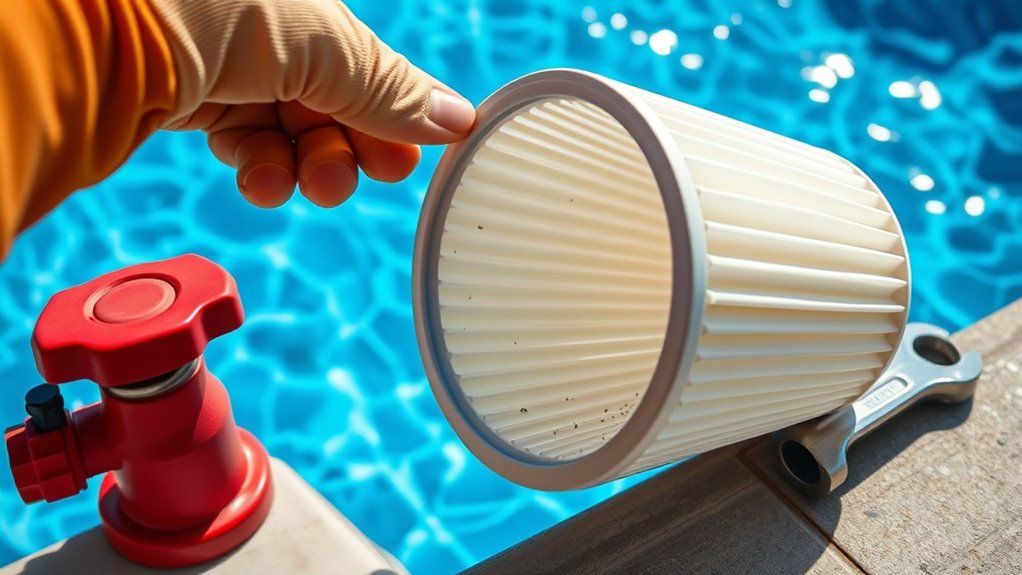
Regularly cleaning and replacing your pool filters is essential for maintaining clear, healthy water. Dirty filters hinder proper chemical balancing and can lead to algae buildup. You should check filters weekly, especially during peak swimming season, and replace them as recommended by the manufacturer. A clean filter guarantees your automatic cleaner operates efficiently and reduces strain on your pump. Recognizing filter maintenance techniques can also help you stay aware of positive changes in your love life. Proper maintenance supports algae prevention and keeps your pool water balanced. Additionally, understanding privacy policies can provide peace of mind while working on your pool maintenance routine. Incorporating regular inspections ensures that your filters remain effective and prolongs their lifespan.
Skimming and Removing Surface Debris Manually
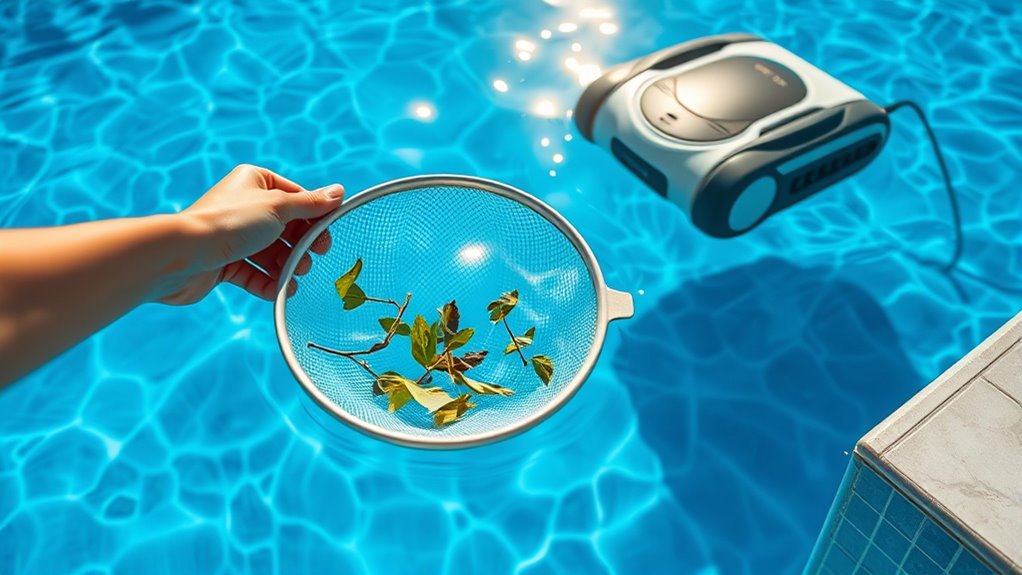
Have you ever noticed leaves, insects, or other debris floating on your pool’s surface? Manual skimming is essential to keep your pool clean and prevent algae control issues. Regular removal prevents debris from sinking and affecting water quality. Using a net, you can quickly clear the surface and help maintain proper chemical balancing. This simple task also reduces the risk of algae growth, which thrives on organic matter. Keep in mind:
Manual skimming keeps your pool clear and algae-free by removing floating debris daily.
- Skim daily during peak debris seasons
- Use a fine mesh net for small particles
- Remove floating debris before it sinks
- Check for and remove any algae patches
- Maintain proper chemical balance to support algae control
- Proper maintenance of your pool ensures the effectiveness of both manual and automatic cleaning methods
Manual skimming complements automatic cleaners, keeping your pool crystal clear and safe for swimming.
Checking for Structural and Surface Issues
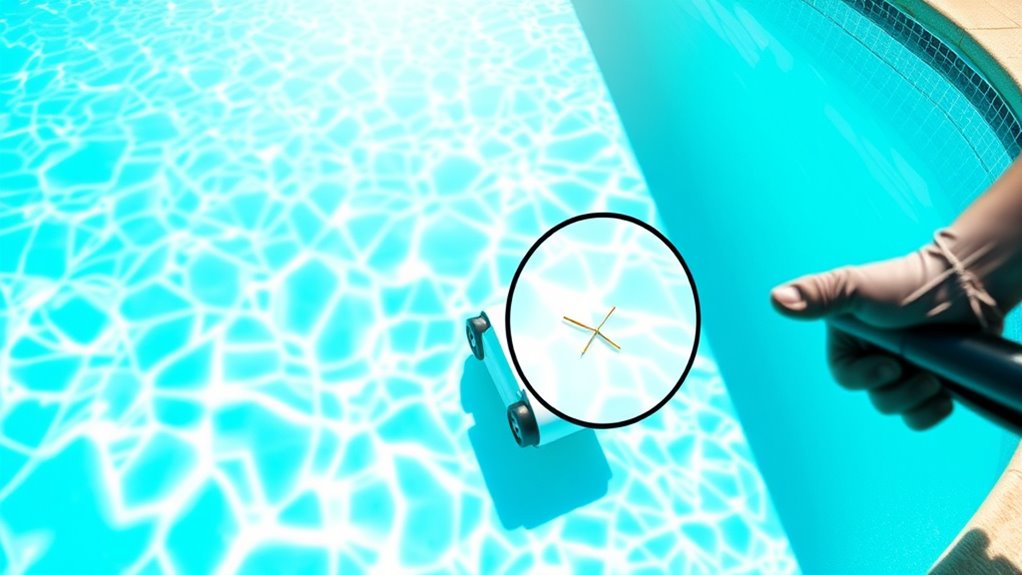
Start by inspecting your pool for any cracks or chips in the surface, as these can worsen over time. Examine the overall surface for signs of wear, such as discoloration or rough spots. Catching these issues early helps prevent costly repairs and keeps your pool in top shape.
Inspecting for Cracks
Inspecting for cracks is a crucial step in maintaining your pool’s integrity. Regularly check the walls and floor for visible or hairline fissures, which can worsen if ignored. Early detection allows you to address issues with crack sealing and structural reinforcement before they become costly repairs. Look for signs like discoloration, bulges, or shifts in the surface. Use a flashlight to spot hidden cracks in shaded areas. Pay special attention to corners and joints where stress concentrates. Remember, small cracks can expand, compromising the structure. Promptly repairing cracks helps prevent leaks and further damage. Keep a close eye on your pool’s surface and structure, ensuring its longevity and safety. Regular inspections save time and money in the long run.
Examining Surface Wear
Examining surface wear is essential for maintaining your pool’s structural integrity and ensuring a safe swimming environment. Look for signs of surface erosion, which can weaken the pool walls or floor, and assess for chemical degradation that may cause discoloration or pitting. Regular inspections help identify issues early before they become costly repairs. Use the following table to understand common surface wear signs:
| Issue | Cause | Solution |
|---|---|---|
| Surface erosion | Constant chemical exposure | Re-surfacing or coating repairs |
| Cracks or chips | Mechanical damage | Professional patching |
| Discoloration | Chemical imbalance | Adjust chemicals and clean |
Regularly Testing Pool Water Quality
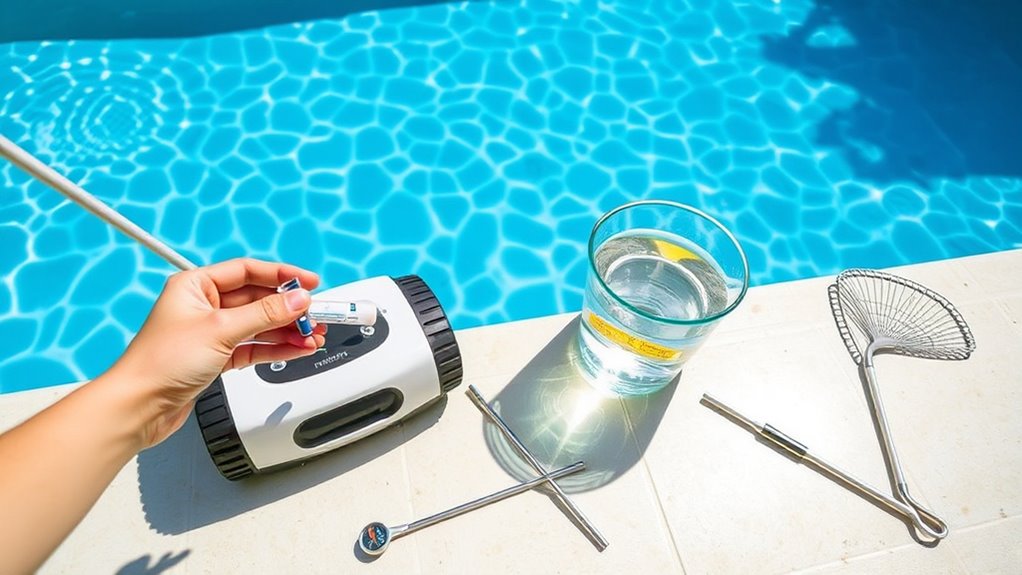
Have you ever wondered why maintaining proper water quality is essential for a clean and safe pool? Regularly testing your pool water helps you catch issues early and ensures an enjoyable swimming experience. By monitoring parameters like pH, chlorine levels, and alkalinity, you prevent problems such as algae growth and chemical imbalances. Consistent testing allows you to:
- Detect imbalances before they escalate
- Achieve effective chemical balancing
- Prevent algae buildup through proper chlorination
- Maintain clear, sparkling water
- Protect your equipment from corrosion or scaling
Focusing on algae prevention and chemical balancing keeps your automatic cleaner working efficiently and reduces manual maintenance. Regular testing is a small step that makes a big difference in keeping your pool pristine and safe for everyone.
Frequently Asked Questions
How Often Should I Manually Check the Pool’S Chemical Levels?
You should check your pool’s chemical levels at least twice a week to guarantee proper balance. Regular chemical testing helps you maintain safe pH and sanitizer levels, preventing algae and bacteria growth. Alongside testing, do routine equipment inspections to spot any issues early. Consistent manual checks keep your automatic cleaner working efficiently and your pool safe and inviting. Don’t skip these essential tasks, even with automatic cleaners in place.
What Signs Indicate My Pool Equipment Needs Repair or Replacement?
You should watch for signs like inconsistent water clarity, filter issues, or lingering odors, which indicate your pool equipment may need repair or replacement. If you notice your pump making loud or unusual noises, or if the filter isn’t functioning properly, it’s a clear sign something’s wrong. Address these issues promptly to prevent further damage and ensure your pool stays clean and safe for swimming.
How Can I Prevent Algae Growth Despite Automatic Cleaning?
Algae prevention is key to keeping your pool crystal clear, even with automatic cleaners. You should regularly test and maintain proper chemical balance, especially chlorine levels, to inhibit algae growth. Brushing the walls and floors helps remove algae spores before they take hold. Also, run your automatic cleaner frequently and shock the pool when needed. Consistent maintenance and chemical balance are your best defense against algae, ensuring a clean, inviting pool.
Are There Specific Safety Precautions When Manually Inspecting the Pool?
When performing a manual inspection, prioritize pool safety by turning off the pump and electrical systems to prevent shocks. Wear protective gear like gloves and goggles to avoid contact with chemicals or debris. Check for loose fittings or sharp edges carefully, ensuring your safety throughout the inspection. Always follow your pool’s safety guidelines, and if you’re unsure, consult a professional to avoid potential hazards during manual pool inspections.
What Are the Best Practices for Winterizing a Pool With an Automatic Cleaner?
Did you know that proper winterization can extend your pool’s life by up to 50%? When winterizing a pool with an automatic system, you should remove or store the cleaner, balance the water chemistry, and lower the water level. Drain the filter, blow out the lines, and add a winterizing cover. These steps guarantee your pool stays protected during months of inactivity and is ready for easy startup in spring.
Conclusion
While automatic cleaners do a lot of the heavy lifting, don’t forget there’s still no substitute for your hands-on attention. Regularly monitoring water chemistry, inspecting equipment, and manually skimming debris keep your pool in top shape. Think of it as giving your pool the TLC it deserves—if you ignore the small stuff, problems can snowball. Stay proactive, and you’ll enjoy a sparkling, trouble-free pool all season long.
